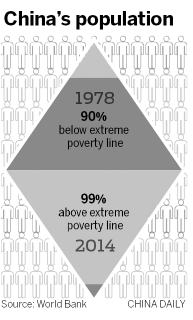China's anti-poverty drive has lessons for all


Can an understanding that remarkable outcomes can be produced only through cooperative actions help China and the US to work together to alleviate the debilitating poverty that continues to grind down billions of people across the world?
Has any antipoverty initiative in history ever lifted more people from abject poverty than the national economic development program China launched four decades ago by opening up its economy to the world?
Imagine what we could call a "Pyramid of Poverty". In 1978, nine out of every 10 individuals in China's population of 1 billion were struggling to survive on an income below the "extreme poverty line"-set by the World Bank at just under $2 a day.
Today, the pyramid has been flipped on its head. As a result, almost all of the more than 1.3 billion individuals who previously would have spent most of their life hungry have doubled their calorie intake. Most of previous generations' waking hours were spent attempting to provide enough food for themselves and their children to survive. Today, families can eat together, stay together, and play together.
Since 1978, China has seen four decades of rapid economic growth. According to the "Rule of 72"-divide 72 by the annual growth rate to determine when an economy or investment will double-the Chinese economy has almost doubled every seven years. Some individual Chinese citizens have experienced a 50-fold increase in their standard of living. It could be argued that 40 years of miracle growth have created a greater increase in human well-being for more individuals than occurred in the previous more than 4,000 years of China's history.
Abject poverty will soon become history
Abject poverty shrinks the human body, degrades the spirit, and shortens life. Malnourishment stunts children's growth, dulls their eyes, and deforms their minds. As the World Bank describes in detail, "children who are stunted have up to 40 percent less brain volume by the time they get past their first 1,000 days", leaving them mentally handicapped for life. Thirty years ago, one in five Chinese children below 5 years old was underweight. Now, it's one in 50.
China's older generations suffered deprivation most people in modern Western countries can barely imagine. Analogues can be found in Charles Dickens' scenes of 19th century Britain, when poverty's grinding reality was less foreign to Western capitals: "Pale and haggard faces, lank and bony figures, children with the countenances of old men, deformities with irons upon their limbs, boys of stunted growth, and others whose long meagre legs would hardly bear their stooping bodies." In Thomas Hobbes' famous summary, for them life was "solitary, nasty, brutish, and short".

The former director of the Research Development Department at the World Bank, Paul Collier, reminds us that poverty not only threatens individuals, but also unravels the fabric of entire societies. His book, The Bottom Billion, describes the harsh reality in the world's most impoverished nations: "The countries at the bottom coexist with the twenty-first century, but their reality is the fourteenth century: civil war, plague, ignorance."
The mission of the World Bank is carved in stone at its headquarters in Washington: "Our Dream is a World Free of Poverty." President Xi Jinping has promised to make this dream a reality for the Chinese people during his tenure. Indeed, as Vice-Premier Liu He announced boldly last January at Davos, "We have set a target to basically eliminate absolute poverty in three years, which means no single rural resident will be living below the current poverty line."
Many in the West are rightly concerned when they think about how a wealthy China will define its role in the world. But the World Bank reminds us that our hands should sometimes do less wringing and more clapping. In 2000, the nations of the world came together at the United Nations to announce eight Millennium Development Goals for the planet. At the top of the list was to cut by half the number of people living in extreme poverty before 2015.
Thanks to China, UN met its development goals
Just four years later, in 2004 World Bank President Robert Zoellick declared that "China's efforts alone" put the world on track to achieve this goal. In Zoellick's words: "Between 1981 and 2004, China succeeded in lifting more than half a billion people out of extreme poverty. This is certainly the greatest leap to overcome poverty in history." And in 2010, five years before the deadline, thanks primarily to China's success, Zoellick declared the mission accomplished.
This year the World Health Organization announced that Chinese babies born today can expect longer "healthy lifespans" than those born in the United States. Shameful as that is for Americans, it is worth considering how America's founding fathers might have greeted this news. Their Declaration of Independence proclaimed that "all" human beings are endowed by their Creator with unalienable rights, the first of which is life. Life is a prerequisite for liberty, happiness, and everything else.
In World War II, when US President Franklin D. Roosevelt declared America's commitment to advance "Four Freedoms" in the world, he featured prominently "freedom from want". His wife, Eleanor Roosevelt, believed that "economic and social rights are as important and as valuable as civil and political rights". As she pointedly put it, "I know only too well that to have a vote is not important if you can't have enough bread to eat." In drafting the UN Declaration of Human Rights, she included "the right to a standard of living adequate for health and well-being…including food, clothing, housing, and medical care and necessary social services". None of these is possible for individuals living in abject poverty.
In the 1960s, US President Lyndon Johnson launched what he called America's "War on Poverty". His ultimate goal was to ensure that all children, "whatever the economic condition of their parents, can start life with sound minds and bodies". Knowing poverty precludes both, Johnson announced a slogan for his war: "The richest nation on earth can afford to win it. We cannot afford to lose it."
President Xi agrees.
Last year, World Bank President Jim Yong Kim highlighted what he called "one of the great stories of history." China, he said, had lifted 800 million people out of the miseries of extreme poverty and thereby extended the life of its average citizens by more than a decade.
Combining strengths to fight for common cause
China's success in adopting its distinctive version of a Party-led market economy, which has overtaken the US to become the largest economy in the world (in terms of purchasing power parity), shocks observers, especially Americans. The thought that another country could become bigger and stronger than they are challenges Americans' conception of "ourselves" and "our rightful role" as the leader of the world. But turning a blind eye to China's rise does nothing to diminish the facts.
The rivalry between the US as the existing superpower and a rising China creates a dangerous dynamic I have called "Thucydides's trap". This dynamic leaves both vulnerable to third-party provocations or events that could trigger responses dragging the two into an unwanted, catastrophic war.
As Xi has repeatedly said, the urgent question is how "to avoid Thucydides's trap". While we search for answers, could Americans and Chinese together find clues in the combination of causal factors that have produced this unparalleled victory for humankind?
The Chinese people are rightfully proud of what their individual efforts and the leadership of their government have done. But they also recognize the fact that this was possible only because of the international economic and security order in Asia that the US constructed in the aftermath of World War II and maintained for the past seven decades. That order enabled all the Asian miracles-and none more than modern China itself.
Could an understanding that such a remarkable outcome could only have been produced by cooperative actions provide insights into ways the two countries might work together to alleviate the debilitating poverty that continues to grind down billions of people in other parts of the world? And if both could cooperate in such an ennobling and mutually beneficial undertaking, perhaps that experience could stimulate more imagination about other ways each can protect and advance its own vital national interests without war.
The author is former director of the Belfer Center for Science and International Affairs and Douglas Dillon professor of government at the Harvard Kennedy School of Government, where he served as founding dean.
































